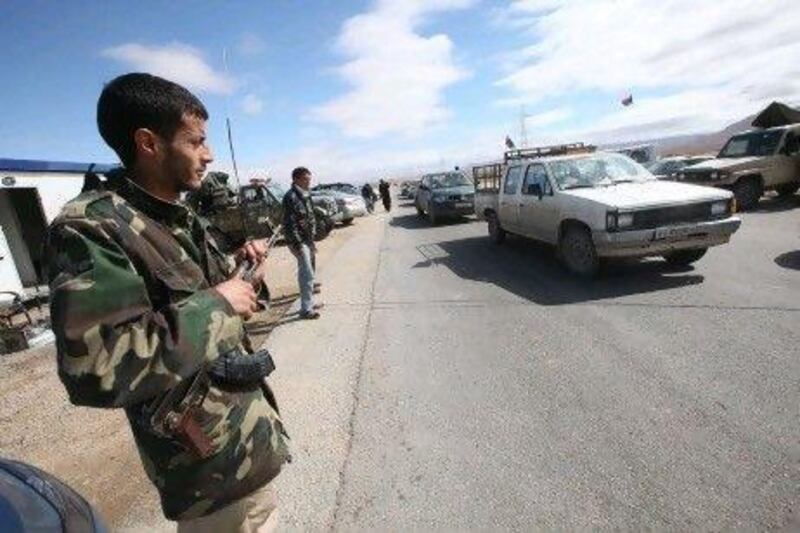ZINTAN // Last year, the men of Zintan in Libya's western mountains formed a brigade and joined the ramshackle revolutionaries who battled their way to Tripoli and toppled Muammar Qaddafi.
The Zintanis were no angels, acquiring a reputation for looting, fighting other brigades and squatting for months in seaside villas in the capital, but Libyan citizens and officials alike acknowledge their bravery.
In their town in the western mountains about 150 kilometres from Tripoli, however, where revolutionary graffiti on crumbling walls is fading in the sun, there are knotty post-conflict difficulties that people say the interim government has failed to address.
Among the challenges - which sum up the nationwide issues newly elected authorities will face - is how to incorporate the thousands of men such as the Zintanis into an official security force.
"Security is out of the control of the transitional government," said Sheikh Abdullah Ahmed, the head of Zintan's branch of the newly formed Supreme Security Council, which was formed by the government and whose role is to maintain checkpoints, act as an emergency service and support the police.
If the situation is more stable than it was six months ago, he said, then it is the militias who can take the credit.
"They did not do a very good job, but they did their best," he said. No one was controlling some of the men who commit crimes and engage in gun battles. "They are not really revolutionaries. They are giving Zintan a bad reputation."
Another problem facing Zintan is the fate of the town's most famous resident, Saif Al Islam Qaddafi, favoured son of the late ruler. He was captured by Zintani militias late last year trying to flee the country and has been held since in the town.
"In Tripoli, anything could happen," said Mohammed Al Wakwak, the head of the town's municipal council, who claimed officials were holding Mr Qaddafi for security.
"In Zintan, no one could possibly attack him or try to break out."
This year, authorities said he would be transferred to Tripoli, once a special prison had been built, but now officials in Zintan and Tripoli say he will stay put.
No date has been set for trial proceedings to begin. He has not as yet been charged with serious crimes in Libya.
Zintan's autonomy from central authority was highlighted when a delegation from the International Criminal Court was held there for 26 days, charged with passing banned material to Saif, whom the court accuses of crimes against humanity.
The four ICC staff members were released on July 2. The release coincided with the visit to Libya by the court's president, Sang-hyun Song.
A final ruling in the case is expected on July 23.
The political reality, say some analysts, is that holding high-value prisoners translates into influence and attention.
A report by the US-based Human Rights Watch, released last week, said that about 5,000 detainees were still held by militias, who had failed to hand them over by July 12, as required by a law passed in May.
"The state security apparatus has so far been unable to confront the well-armed militias across Libya that continue to hold detainees," said the rights group in a statement. It identified former regime officials, suspected loyalists, mercenaries, and migrants from sub-Saharan Africa as the bulk of those held.
The deputy justice minister Khalifa Ashour's frustration was evident as he talked about his months-long mission to encourage militias to hand over their makeshift prisons to the authorities.
"It was really hard to communicate with these people," he said. "It was really exhausting."
Mr Ashour explained that in Misurata, Zawiya and parts of Tripoli he had conducted negotiations with militias whose leaders' demands and rules kept changing.
"In Misurata, it was really hard," he said. "They had a lot of celebrity people so it was hard to get them to give them up - because these people would pay a lot of money just to get out."
One such individual is Mahdi Al Arabi, a high-ranking army officer held in Zawiya, a former government official.
Throughout the country, most detention centres today are run by a mix of militias (the good revolutionaries, Mr Ashour said), and forces and officials paid by the government. "At least we can get into the prison and see what's going on," he said, but acknowledged that the justice ministry was a long way from having control.
Post-war grievances have also intensified old tribal tensions, he said.
Fighting between Zintani forces and rival groups from the Mashashia tribe have killed dozens in recent weeks. The fighting is mirrored in continuing tribal clashes in Kufra in the south and in tension between the revolutionary hub of Misurata and the historically Qaddafi loyalist Bani Walid.
The transitional government has neglected these problems, said Mukhtar Al Akhdar, a senior commander of Zintan's rebel forces, who was receiving visitors in a vast mansion in Tripoli. "The transitional government was having breakfast with the Americans, lunch with the British. They don't care about Libya," he said indignantly. "And Libyans die."
Although he hopes that the new government will work harder to improve infrastructure, stability and employment, Mr Akhdar said that he did not vote in the recent parliamentary elections.
His limited faith in the role of the central government says much about the challenges the elected will face.
"Did you vote in the election?" he asked one young Libyan man with the telltale indigo stain. "Did you dip your finger in the ink? I dipped my finger in the blood of the martyrs."





